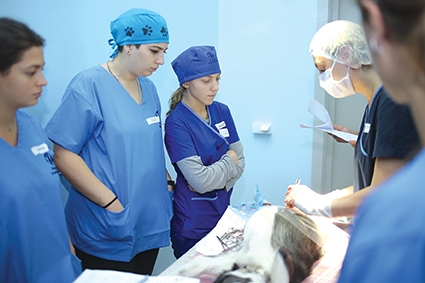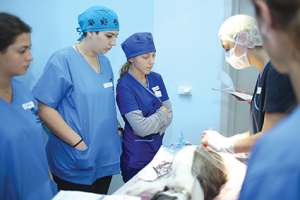Neuter and Spay Day with Mayhew International in Tbilisi
Following The Mayhew International’s visit to Tbilisi and a Neuter and Spay Day held last Sunday at the Tbilisi Agrarian University Veterinarian Clinic, offering free neutering for street and shelter dogs, GEORGIA TODAY spoke with Caroline Yates, CEO of Mayhew Animal Home about The Mayhew International activities in Georgia. We discussed the possibilities of solving the issue of street dogs that to a large extent remains unsolved not only in Tbilisi, the capital, but throughout the country.
The Mayhew Animal Home is one of the few animal welfare organizations that provides veterinary trainings in Georgia, having regularly sent its vet teams to Tbilisi over the last few years. The organization managed to successfuly collaborate with city authorities, local NGOs and the Agrarian University of Georgia- the only establishment so far offering veterinary training and shelter management training in the country.
What made you decide to come to Georgia?
The Mayhew Animal Home operates a study program for vets from overseas who want to do something about the issues in their own country. One of the first vets we had in 2009 was Marika Chkhikvishvili, who came for an intensive study course in spaying and neutering. She was one of our best students. When she became the Head Vet at the Agrarian University Veterinarian Clinic not only were we happy, but we thought maybe we could help. We first came to Tbilisi in 2013, just to see what was going on, since we knew from Marika that things were quite bad, with lots of dogs on the streets and no organized structure in place to deal with them.
When we came, we did some training here at the university and then we went to see the municipal shelter and, basically, it’s grown from there. We’ve come back every year since then and our visits comprise of vet training, support of some of the local charities, helping in the Trap, Neuter, Vaccinate, Release program, and also, more recently, we’ve started working with the Agrarian University to try and suggest improvements to the Veterinary Science degree- what we’ve found out is that in veterinary schools there is very little understanding about cats and dogs, with a considerable holes in the curriculum. Georgia is not alone in this- it’s the same throughout Eastern Europe and former Soviet Union countries. It’s rather concerning when you have inexperienced people conducting surgical procedures!
Are there any visible changes since your last visit?
Oh, absolutely! There’s still a lot to do, but there is visible change. In fact, we would say that Tbilisi City authorities have been very open to our suggestions. That’s why we come back - because they’re showing willingness to change.
What do you think the most difficult thing is to change, a policy or an attitude?
There have been new legislations and policies brought in… How that is enforced is always a problem not only in Georgia but in every country you go to. The most difficult thing is to change the attitude of people and the understanding of why there are dogs on the streets, where they come from and how we can deal with it in a sustainable, humane way. There must be a long-term approach. Taking an animal from the street to the shelter is not enough. The main thing that people fail to realize is that dogs roaming the streets come from owned dogs that are not sterilized or castrated, often freely let out onto the streets. Dogs get pregnant and people don’t want puppies, so the street dog population grows.
In your opinion, is Tbilisi a dog-friendly city?
There are lots of Georgians who love their pets and you do have lots of dog owners. The problem lies in understanding the issues that a large quantity of street dogs may bring, so you need to explain it clearly to the general public and share the solution. The major challenge is to get local communities onboard.
Do you plan to train Georgian students at Mayhew International, UK?
We want to start accepting more students and we’ve even made our building bigger. We will hopefully have some Georgian students at the end of next year, but when we come here we can reach many more. They may not do practical work immediately, but they can participate in events like these, in lectures, and the same goes for vets and vet assistants at the Tbilisi municipal shelter as well.
How would you summarize the recent Neuter and Spay Day?
Because of our relations with the Agrarian University Veterinarian Clinic, we’ve trained quite a few vets here who will then show their practice to the students. It’s always good that they see high standard surgery, a humane way of dealing with and handling the animals. If you can change the simple things, it can have a big impact on the way people carry a dog, inject them, and care about them before and after the surgery.
Nino Gugunishvili












